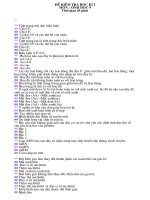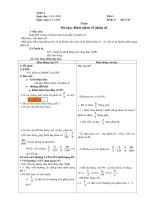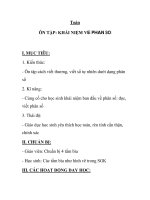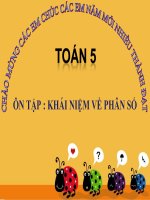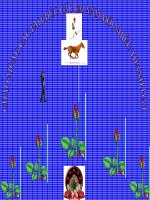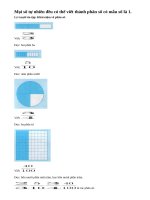4 PRACTICE TESTS ON LEXICAL CLOZE
Bạn đang xem bản rút gọn của tài liệu. Xem và tải ngay bản đầy đủ của tài liệu tại đây (613.51 KB, 4 trang )
4 PRACTICE TESTS ON LEXICAL CLOZE | Biên soạn: Nguyễn Tiến Dũng (mrnsapro)
4 PRACTICE TESTS ON LEXICAL CLOZE
PASSAGE 1
Read the following passage and mark the letter A, B, C or D on your answer sheet
to choose the word or phrase that best fits each of the numbered blanks from 1 to
10.
Since retail sales of our new product line have fallen (1)_____ in the last few weeks,
we are going to ask our customers to complete feedback forms to see why this is happening.
I’d particularly like to know if our marketing (2)_____ has been alienating our (3)_____
customers. In all (4)_____, it is the result of a general economic dip but we need to make sure
as several customers have (5)_____ objections about the (6)_____ campaign we’ve been
running. (7)_____ mind that the campaign has been successful in attracting new customers, I
do not want to lose long-term ones, some of whom I am (8)_____ certain are already looking
for alternative products. In fact, social media these days can (9)_____ a great risk to a
company’s reputation as it is very easy for one person (10)_____ themselves, to tell the world
about a company’s failings.
Question 1: A. slightly
B. reasonably
C. relatively
D. fairly
Question 2: A. technique
B. placement
C. strategy
D. launch
Question 3: A. devoted
B. dependable
C. responsible
D. loyal
Question 4: A. possibility
B. luck
C. likelihood
D. prospects
Question 5: A. put
B. realised
C. posed
D. raised
Question 6: A. advertising
B. publicising
C. selling
D. promoting
Question 7: A. Doesn’t
B. Never
C. Don’t
D. Forever
Question 8: A. greatly
B. pretty
C. adequately
D. effectively
Question 9: A. offer
B. pose
C. make
D. give
Question 10: A. for
B. with
C. as
D. by
Page 1
4 PRACTICE TESTS ON LEXICAL CLOZE | Biên soạn: Nguyễn Tiến Dũng (mrnsapro)
PASSAGE 2
Read the following passage and mark the letter A, B, C or D on your answer sheet
to choose the word or phrase that best fits each of the numbered blanks from 1 to
10.
What is meant by the term economic resources? In general, these are all the natural,
man-made, and human resources that go into the (1)_____ of goods and services. Economic
resources can be broken down into (2)_____ general categories: property resource – land
and capital, and human resources – labor and entrepreneurial skills.
What do economists mean (3)_____ land? Much more than the non-economist, land
refers to all the natural resources (4)_____ are usable in the production process: arable land,
forests, mineral and oil deposits, and (5)_____ on. What about capital? Capital goods are all
the man-made aids to producing, storing, transporting, and distributing goods and (6)_____.
Capital goods differ from consumer goods in that (7)_____ satisfy wants directly, while the
former do so indirectly by facilitating the production of consumer goods. It should be noted
that capital as defined here does not (8)_____ to money. Money, as such, produces nothing.
The term labor refers to the physical and mental talents of humans used to produce
goods and services (with the exception of a certain set of human talents, entrepreneurial skills,
which will be considered separately because of their special significance). Thus the services
of a factory worker or an office worker, a ballet (9)_____ or an astronaut all fall (10)_____ the
general heading of labor.
Question 1: A. production
B. plant
C. using
D. doing
Question 2: A. many
B. six
C. two
D. some
Question 3: A. by
B. using
C. calling
D. with
Question 4: A. these
B. they
C. what
D. that
Question 5: A. so
B. come
C. such
D. go
Question 6: A. money
B. machines
C. crops
D. services
Question 7: A. later
B. lately
C. the latter
D. the latest
Question 8: A. come
B. go
C. speak
D. refer
Question 9: A. director
B. performance
C. writer
D. dancer
Question 10: A. into
B. from
C. under
D. to
Page 2
4 PRACTICE TESTS ON LEXICAL CLOZE | Biên soạn: Nguyễn Tiến Dũng (mrnsapro)
PASSAGE 3
Read the following passage and mark the letter A, B, C or D on your answer sheet
to choose the word or phrase that best fits each of the numbered blanks from 1 to
10.
The Industrial Revolution in Britain was built on the use of machines in factories. Since
the 1950s, Britain's (1)_____ industries have replaced machine operators with computers,
and this (2)_____ has led to a decline in the number of (3)_____ in many factories. Goods are
bought and used much more than ever before but a lot of these goods are imported. By the
beginning of the 20th century, other industrial countries like the USA were (4)_____ with
Britain's exports, and countries in the Far East have been able to provide cheaper (5) _____
since the 1970s. Areas located with heavy industries are suffering high unemployment.
During the last 30 years, there has been a constant rise in smaller industries (6) _____ as
“light industries”. These ones use electricity and are not (7)_____ on raw materials such as
coal so they are "footloose", i.e. they can be located anywhere. They produce such things as
washing machines or spare (8)_____. Some of these industries produce nothing at all, but
provide services like distribution. The consumer boom of the 1980s and the increased leisure
time of most Britons have led to rapid (9)_____ in service industries like banking, tourism,
retailing and information processing, and in industries which distribute, maintain, and repair
(10)_____ consumer goods.
Question 1: A. manufacturing B. big
C. large
D. running
Question 2: A. replacement
B. change
C. exchange
D. automation
Question 3: A. employers
B. employees
C. labors
D. servers
Question 4: A. working
B. familiar
C. competing
D. fed up
Question 5: A. things
B. products
C. produce
D. imports
Question 6: A. considered
B. regarded
C. known
D. worked
Question 7: A. dependent
B. reliable
C. dependable
D. command
Question 8: A. details
B. parts
C. sections
D. gadgets
Question 9: A. growth
B. increase
C. expansion
D. extension
Question 10: A. everyday
B. home
C. household
D. expensive
Page 3
4 PRACTICE TESTS ON LEXICAL CLOZE | Biên soạn: Nguyễn Tiến Dũng (mrnsapro)
PASSAGE 4
Read the following passage and mark the letter A, B, C or D on your answer sheet
to choose the word or phrase that best fits each of the numbered blanks from 1 to
10.
The latest addiction to trap thousands of people is Internet, which has been (1)_____
for broken relationships, job losses, financial ruin and even one suicide. Psychologists now
recognize Internet Addiction Syndrome (IAS) as a new illness that could (2)_____ serious
problems and ruin many lives. Special help groups have been set up to (3)_____ sufferers
help and support.
IAS is similar to (4)_____ problems like gambling, smoking and drinking: addicts have
dreams about Internet; they need to use it first thing in the morning; they (5)_____ to their
partners about how much time they spend online; they (6)_____ they could cut down, but are
unable to do so. A recent study found that many users spend up to 40 hours a week on the
Internet; (7)_____ they felt guilty, they became depressed if they were (8)_____ to stop using
it.
Almost anyone can be at risk. Some of the addicts are teenagers who are already
hooked on computer games and who (9)_____ it very difficult to resist the games on the
Internet. Surprisingly, however, psychologists (10)_____ that most victims are middle-aged
housewives who have never used a computer before.
Question 1: A. accused
B. mistaken
C. blamed
D. faulted
Question 2: A. take
B. cause
C. affect
D. lead
Question 3: A. recommend
B. offer
C. suggest
D. advise
Question 4: A. others
B. another
C. the other
D. other
Question 5: A. lie
B. cheat
C. deceive
D. betray
Question 6: A. rather
B. want
C. prefer
D. wish
Question 7: A. unless
B. without
C. although
D. despite
Question 8: A. made
B. allowed
C. let
D. had
Question 9: A. have
B. find
C. feel
D. say
Question 10: A. say
B. tell
C. object
D. promise
Page 4

